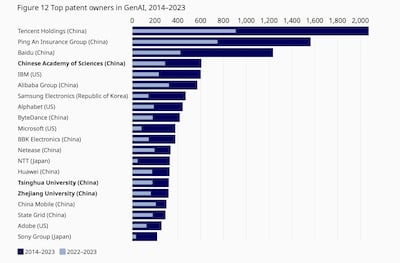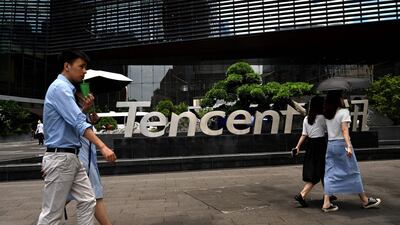Inventors in China are filing the most generative artificial intelligence patents, significantly dwarfing the patent filings from the US, South Korea, Japan, India, the UK and Germany, the UN agency for intellectual property has said.
Between 2014 and 2023, 38,210 inventions involving generative AI were filed in China, six times more than second-placed US, which had 6,276 filings during the period, the World Intellectual Property Organisation said in a report.
"GenAI has emerged as a game-changing technology with the potential to transform the way we work, live and play," said Daren Tang, director general of Wipo.
"Through analysing patenting trends and data, Wipo hopes to give everyone a better understanding of where this fast-evolving technology is being developed, and where it is headed," he added.
Unlike the overall concept of AI, the field of generative AI largely involves the creation of new content in the form of images, video, text, speech, sound and music.
In recent years, generative AI has been applied to software development, life sciences, health care and finance sectors, often speeding up traditionally tedious tasks.
This has led to an entrepreneurial and technological race globally to capitalise on the potential of generative AI.

Chinese companies and institutions dominated the generative AI patent space, securing six of the top 10 slots, the Wipo report found.
Three US companies, Microsoft, Alphabet and IBM, placed in the top 10 as well, with South Korea's Samsung also on the list.
While India placed fifth in terms of generative AI patent filings, it led the way in terms of expansion, with a patent filing growth rate of 56 per cent.
Wipo's report highlighted the 2022 release of OpenAI's ChatGPT as a turning point for generative AI patent publication and research publication, helping to create enthusiasm from consumers, the private sector and governments.
"This is because the OpenAI platform has made it easier for all users to access advanced GenAI programs, particularly large language models (LLMs)," the report said.
"These models have reached new levels of performance, demonstrating the potential for various real-world applications, triggering a wave of research and development, and large corporate investments in GenAI."

Curiously, despite being one of the world's flagship generative AI companies, US-based OpenAI is not featured on Wipo's charts for AI patent filings.
"OpenAI does not appear to have filed any patents for its research activities until the beginning of 2023," report said.
"An explanation for this might be the non-profit origin of OpenAI ... the company later transitioned from non-profit to a 'capped' for-profit model. An alternative explanation might be that OpenAI is opting to retain its IP in the form of trade secrets," it added.
In terms of the categories for generative AI patent filings since 2014, image and video data patents lead the way with 17,996 inventions, followed by 13,494 text inventions, and 13,480 speech/music inventions.
Despite the promising outlook for AI patent filings, Wipo's report notes concerns about potential labour market disruption caused by the technology.
"Unlike previous waves of automation, which mainly affected middle-skilled workers, the risks of AI displacement extend to certain higher-paid positions such as certain types of data analysts, market research analysts, bookkeepers or paralegals," it said.
But it also stressed that patent filings could help blunt the potential impact on labour markets, and create opportunities for those who make the most of the data.


